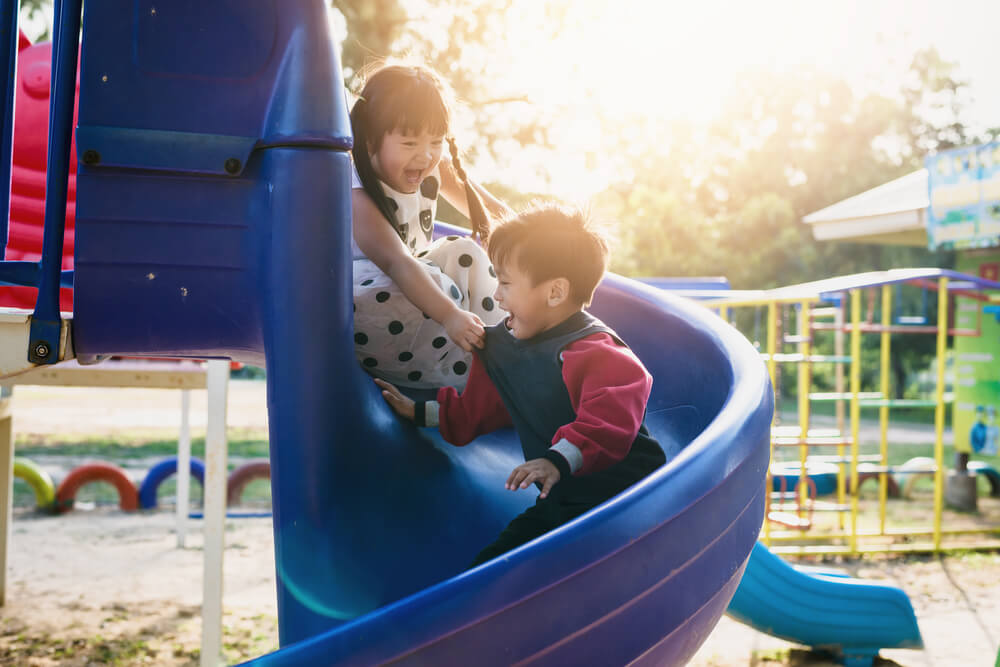
The Importance of Play in Early Childhood
Play. To many, a simple, daily activity built into a child’s schedule where children are free to use their imaginations, set their own rules, and just be “kids.” But there is more to play than what meets the eye. Play is an essential part of a child’s overall development. As children develop, they pass through several stages of play where they learn about the world around them. Whether a child is engaged in solitary play, parallel play, cooperative play, or imaginative play, the benefits of such a simple activity have a lifelong impact on the person they are becoming.
Play and a Child’s Development
The whole child focuses on a child’s whole self, considering their development across five domains. These five domains work together to create a well-rounded child. Let’s look at some of the benefits of play across each developmental domain.
Physical Development
The simple act of playing encourages fine and gross motor development and helps a child with . . .
- Strengthening bones and muscles
- Coordination and flexibility
- Balance
- Spending their natural energy, which may encourage them to stay active later in life
Intellectual/Cognitive Development
As children engage in play (of any type), they will learn skills that will carry over into all aspects of their life. Every child will advance through certain stages of development (based on their age). Through their interaction with their environment and with others, children will learn specific skill sets like:
- Problem-solving
- Critical thinking
- Reasoning
- Drawing conclusions
- Enhanced listening skills
- Following directions
- Learning rules and boundaries
- Assimilation and accommodation
- Concept learning—colors, shapes, numbers, letters, etc.
Emotional Development
Whether a child plays alone or with others, play helps a child with their development of feeling, self-regulation, self-discipline, and other critical areas, such as:
- Coping skills for emotions like fear, anger, and aggression
- Empathy and understanding of others’ thoughts and feelings
- Creating new worlds
- Expanding upon their imaginations
My goal in creating Thundermaestro was to tap into the emotional side of writing to create a picture book that addresses a common childhood fear (thunderstorms), flipping the perspective of a thunderstorm being a scary event to seeing it as Mother Nature’s music. This book allows the reader to see a thunderstorm through the eyes of an imaginative child. The main character, instead of fearing the impending storm, controls the storm using her imagination and its sounds to create her symphony.
Social Development
When we hear the term “play,” one might think of the social aspect of it—children interacting with other children and learning to play cooperatively. While this is true, there are many other beneficial concepts children learn in addition, including:
- Negotiation of group dynamics
- Collaboration
- Compromise
- Sharing and turn taking
Language Development
As children grow and mature, the skills they’ve learned through play become more varied and complex. At all stages of development, children are building upon their language skills (both receptive and expressive). These skills become the building blocks for later social and learning experiences. Through play, children develop:
- More complex vocabulary
- An understanding and exchanging of thoughts, information, or messages
- An increased sense of independence
To facilitate language development, read a book together! Books are filled with opportunities to expand upon your child’s speech, language, and memory skills. Read familiar stories and introduce new ones. Exposing your child to a variety of books helps with building new vocabulary. Another key piece is to choose books with simple pictures and simple text. When I wrote Thundermaestro, I intentionally used repetitive phrases so children could be active participants in the reading experience. As you read, pause and allow your child to fill in the remaining parts of the sentence. Children will feel as though they are “reading!”
In summary, play is an essential part of development. It is how children make sense of their experiences and the world around them. Whether or not a child’s play is self-directed, imaginative, unstructured, or cooperative, play is the cornerstone of a healthy childhood.
Annemarie Riley Guertin is a wife, mother, teacher, and Amazon best-selling author of several books for children. In 2016, she began to write professionally, crafting books for children with themes of kindness and dreaming big! Annemarie holds a bachelor’s degree in Early Childhood Education from Boston University’s Wheelock College and a master’s degree in elementary education M.Ed. (summa cum laude) from Fitchburg State University. She teaches Early Childhood Education in Massachusetts, where she lives with her husband and their two children.
